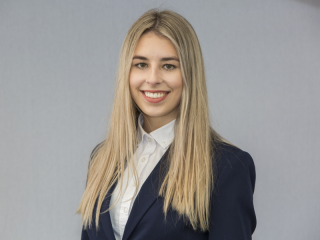What encouraged you to pursue a Master's degree at UCL Laws?
During my undergraduate degree, I attended a cross-university seminar series on family law where I was introduced to Dr Rob George, a Professor at UCL Laws and family law barrister. I decided to study an LLM because during this series, I realised that there was so much more for me to learn about family law, and I wanted to develop my analytical and research skills further, to better equip me for my desired career as a barrister. I chose UCL because it had a wide range of module options and extracurriculars; it allowed me to study in London and experience a new city; and the lecturers are considered leading experts in their fields. The choice of LLM modules explored how judges make decisions; the relationship between lawyers and their clients; and how the public accesses justice. These topics were distinct from my undergraduate law degree, and I was keen to develop a wider perspective on law, justice and society.
What did you learn during your time at UCL Laws, in class or out?
I studied a wide range of modules which fell within my specialism of social justice. In terms of family law, I wrote my research essay on domestic abuse and child contact, looking at psychology and legal literature to look at the effects of trauma and how this can be reflected in the law. I also studied children and their rights where I learnt about identity, medical decision-making, and participation rights for children. I adapted my access to justice essay to look at family law; wrote about domestic abuse victims seeking asylum in refugee law; and in my legal needs and assistance module, I wrote one of my favourite essays about the public’s belief that cohabiting couples have rights akin to marriage, who this is most likely to affect, and how we can address this issue. I also studied fascinating modules on judicial decision-making about how judges make decisions and the subsequent value of diversity in the judiciary. Outside of lectures, I studied a non-credit module on law teaching, learning about becoming a professor and effective teaching methods. This allowed me to gain an appreciation of the routes to becoming a law teacher. I also undertook pro bono work which taught me so much about the role of empathy in the legal profession and the value of community.
What is your fondest memory of your time here?
My fondest memory is my volunteer placement at Oasis Community Partnerships. Each Friday, I volunteered in an embedded school setting, assisting with housing, benefits, and school meal applications. This volunteer placement was valuable because it allowed me to contribute to the local community and to help people find solutions to their legal issues. This placement complimented my studies because I was able to implement my readings on building strong client relationships and observe the benefits of people accessing justice in embedded structures, as we were located within a school. Furthermore, working with families in this placement cemented for me that I would like to work in an area of law that involves working with individuals. I intend to use a trauma-informed approach when working with clients at the family Bar, based on the training that I received for this position where I learned about the value of therapeutic advocacy.
Can you tell us a bit about your current role and what a typical day looks like to you?
I am currently studying the Bar course at the Inns of Court College of Advocacy. So far, this has involved studying for the civil and criminal litigation exams which I sat last week! I am now awaiting the results of these exams, and in the meantime, I have returned temporarily to my previous role as a paralegal at a local authority in the Midlands, working on child safeguarding cases. A typical day in this role involves drafting applications for care and deprivation of liberty cases; drafting case summaries; and creating bundles for court. Occasionally it can involve attending court and writing notes which enables me to gain a better appreciation of the court room and the role of lawyers. The second part of my Bar course, which will resume next year, involves learning about drafting legal documents, examining witnesses and delivering speeches.
What have been your career highlights to date?
A highlight of my career was being awarded scholarships from Lincoln’s Inn, the Family Law Bar Association, and the Leonard Sainer Legal Education Foundation to study the barrister training course. These application and interview processes involved demonstrating a commitment to the family Bar and evidencing my skills and experience. The success of these applications has led to funding which has allowed me to start the Bar course.
A further career highlight was working as a research assistant to Dr Rob George. It was an amazing opportunity to experience part of what a career in academia involves and to research an area of family law in depth. I have a huge amount of admiration for Dr George’s achievements, and he has inspired me to contribute to academia and policy in the future, alongside building a career at the Bar.
This year I applied for, and secured pupillage. It was a challenging experience – however, I learnt so much in this process. I am especially grateful to Stephen Gurman, UCL’s law careers consultant. Stephen gave me valuable application and interview support in the form of targeted feedback and thoroughly researched mock interviews. Furthermore, the academic community at UCL Laws have wide-ranging expertise and backgrounds, including professors who have practised at the Bar. They were very approachable and were open to answering questions about their careers. Most importantly, I always felt encouraged to dream big and stay in contact with the Faculty.
 Close
Close


